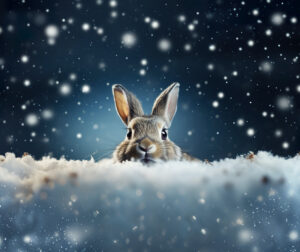Manidoo-giizisoons Nagomowin (December Song)

What you learn in this song:
In this song a child asks older relatives to tell the kind of story or legend known as an “aadizookan,” a teaching story. These very old stories are only told in winter and are considered animate.
Each verse of the song starts with the name of a relative and the song helps point out that there are the relatives on your mother’s side and your relatives on your fathers side sometimes have different names.
In Ojibwe, names of relatives require a pronoun to be attached to the start of the word so you are always saying my or your or his or her relative.
For example:
- Nookomis = my grandmother
- Gookomis = your grandmother
- Ookomis = his or her grandmother
In this song, the singer is referring to their own relatives and therefore each verse begins with an N’ pronoun before the name of each relative.
The second line of every verse recognizes changes taking place at this time of year in Anishinaabewakiing (Anishinaabe territory) which is the Great Lakes region where over 140 nations are working to revitalize this language.
Manidoo-giizisoon (December) is when snow falls and winter storytelling begins.Tradition dictates that these stories are saved for this time of year and not told at other times of year. This song makes allusions to one particular story about how fire came to the Anishinaabe. One particularly beautiful version of this story to look at at this time of year can be found at http://ojibweproject.weebly.com/
Which is a website named Baadwedangig created by two teachers, Dr. Alan Corbiere, Dr. Alana Johns, and a number of their students who worked from the writings of William Megasiáwa Jones. This story was told by Waasaagoneshkang from Pelican Lake near Bois Fort Reservation.
The song also reminds speakers of the way words are connected as the name of the month Manidoo-giizisoons contains the word “manidoo” who are the non-human beings often featured in winter stories. Another example is the way “waab” from both “to see” and “white” can be found in “waabooz” (rabbit), “waaboozwaagonagaa” (large white snow flakes), and “giizhoowaabooyaan” (warm blanket.” We know that blankets were made with strips of rabbit fur and perhaps large snowflakes look like rabbit paws, but we can be sure when we see “waab” in a word, it will lead us to ideas of sight and whiteness.
Nookomis aadizookawishin.
My grandmother, tell me a legend.
Manidoo-giizisoonsing ani-zaagaasige ajina giizis.
It’s December and the sun is shining less.
Gigikenimaa ina waawiiyadetaagozi waaboozoons?
Do you know the cunning bunny?
Nimishoomis aadizookawishin.
My grandfather, tell me a legend.
Manidoo-giizisoonsing ani-gashkii-dibikad ginwenzh.
It’s December and the dark night is longer.
Gigikendaan ina gaa-ezhiwebag gashkadin gichigami?
Do you know what happens when the sea freezes?
Nizigos aadizookawishin.
My father’s sister, tell me a legend.
Manidoo-giizisoonsing mii waaboozwaagonagaa omaa.
It’s December and the snow is falling in big flakes here.
Gimikwenimaag ina odaanisan akiiwenzii endaad giizhigong?
Do you remember the daughters of the old man in the sky?
Ninoshenh aadizookawishin.
My mother’s sister, tell me a legend.
Manidoo-giizisoonsing niwaabandaan ninesewin.
It’s December and I can see my breath.
Gimikwenimaa ina ogozisan Ningaabii’an Noodin?
Do you remember the son of the West Wind?
Inzhishenh aadizookawishin.
My mother’s brother, tell me a legend.
Manidoo-giizisoonsing miinawaa waaboozoo aandawe.
It’s December and the hare is changing the color of his fur.
Gimikamaw ina giizhoowaabooyaan endaayang?
Can you find a warm blanket for me at home?
Nimishoomenh aadizookawishin.
My father’s brother, tell me a legend.
Manidoo-giizisoonsing nimbawaazhaag nibaaganing.
It’s December and I am dreaming of them in my bed.
Gibawaazhaag ina gakina manidoog adizookaning?
Do you dream of all the manidoog in the legends?
